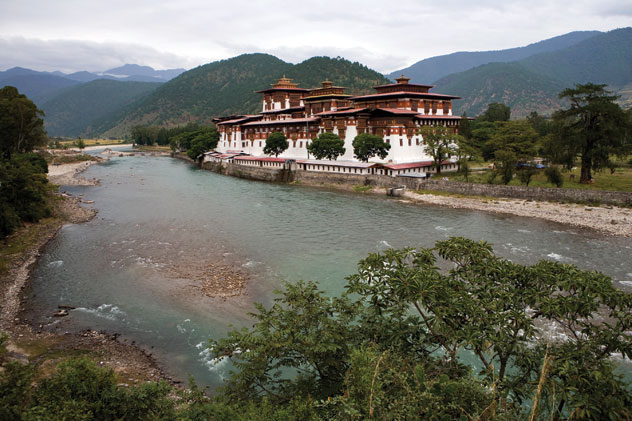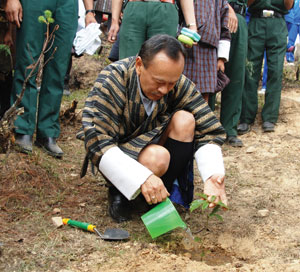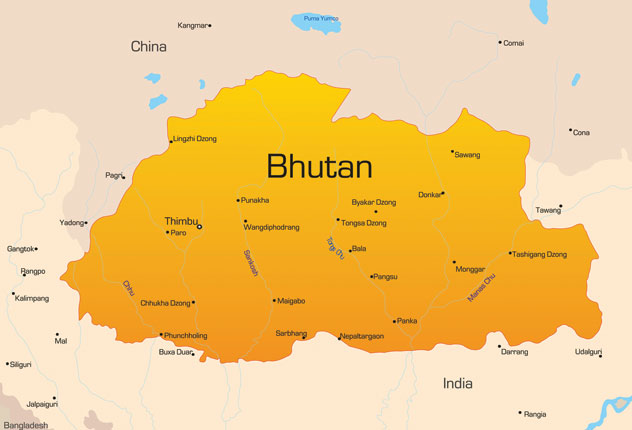ENVIRONMENT:
Climate Change Woes: Bhutan Unhappy
Smaller nations such as Bhutan and Maldives could end up being the biggest losers in the climate change battle as bigger countries try and negotiate their standpoints, writes Siddharth Srivastava.

(Above): Punakha Dzong in Bhutan.
Tiny nations and islands such as Maldives have long been seen as the most vulnerable to climate change and global warming.
Bhutan, a small Himalayan kingdom nation, sandwiched between India and China, is another country that is concerned about changing weather patterns that threaten regional water supplies and the Kingdoms plans to harness the energy of the Himalayan snowmelt.
Bhutan’s Prime Minister Jigmi Thinley recently warned that the “impact of global warming on hydrology is very severe. The glaciers are retreating very rapidly, some are even disappearing.”
Thinley added that “the flow of water in our river system is fluctuating in ways that are very worrying. In the summer they overflow their banks in a way that used to never happen in the past and in the winter they shrivel and almost dry up.”
Bhutan, a nation of 700,000 people, is known to follow an unorthodox Happiness Index as opposed to the regular GDP growth figures worldwide, as indicator of welfare of its population.
A key aspect of this approach is the use of renewable hydropower that makes the country a carbon neutral electricity generator and move towards economic self sufficiency.
The hydro energy potential of the country is pegged at 30,000 MW that can be a major revenue earner via export to power deficit neighbors India, Bangladesh and Nepal.
However, climate change could spoil Bhutan’s plans, with the kingdom currently involved in installing early warning systems against flash floods and breach of natural dams. Wetter summers and drier winters are making the country re-think its hydro generation plans.
Excess rainfall can also cause flood situations in downstream populous northern Indian states such as Bihar and Uttar Pradesh.
 (Right): Prime Minister of Bhutan, Lyonchhen Jigmi Y. Thinley and volunteers planted thousands of seedlings in the fire burnt areas in and around Thimphu to commemorate important occasions such as Social Forestry Day, Children Day and Coronation of 4th Druk Gyalpo. [Photo: Choidup Zangpo] (Right): Prime Minister of Bhutan, Lyonchhen Jigmi Y. Thinley and volunteers planted thousands of seedlings in the fire burnt areas in and around Thimphu to commemorate important occasions such as Social Forestry Day, Children Day and Coronation of 4th Druk Gyalpo. [Photo: Choidup Zangpo]
“Hydropower may not be the sort of exponential source that we considered it to be,” said Thinley. “The flow during the winter and summer used to be regulated and the variation was not so much. Now it is so much that in the winter, we are importing electricity from India.”
Bhutan has been trying to bring to the notice of global forums, its problems. In November, the country is hosting a regional conference to work out ways to minimize impact of global warming on mountains.
The Climate Change Debate
At a broader level Bhutan will hope that a consensus emerges on the climate change debate in the near future that will set up the post Kyoto Protocol paradigms.
A lot will depend upon the leadership skills of Brazil, Russia, India and China (BRIC nations) to chaperone a new system of emission cuts that can impact smaller nations such as Bhutan positively or negatively.
Tackling climate change is a concern that has divided developed and developing countries with the latter subscribing to a “polluter pays” and “collective but differentiated” responsibility in checking greenhouse gas emissions.
This means that developed nations bear the burden (financial and technological) of addressing environmental damage, while the rest can adapt accordingly.
The Kyoto Protocol currently exempts developing countries from reduction commitments that continue till 2012, following which a new regime has to be in place.
However, it will not be easy for developing nations to remain unaffected by the impact of global climate change action, even if it is deemed unfair.

(Above): Map of Bhutan.
Washington has been blocking efforts of the Group of Eight industrialized nations to agree to targets for cutting carbon emissions, insisting that the onus be shared by the emerging economies such as India and China.
The International Monetary Fund has, meanwhile, said that any policy framework for multilateral action on climate change would be difficult without the BRIC countries as in the next 50 years, 70 percent of emissions are projected to come from emerging and developing economies.
India’s federal commerce ministry has repeatedly warned over the recent past that poorer nations should be prepared to deal with carbon tax and other trade related “arm-twisting tactics” that will increasingly be linked to acceptance of environment “norms,” by advanced countries.
The ministry has said goods exported to the EU will likely face non-tariff barriers if the grouping imposes a carbon tax on goods imported from ‘advanced developing countries,’ a category that the BRIC countries may be pushed into to suit western interests.
India is also unhappy about being clubbed with China on emission levels, as its contribution is far below the major emitters, the U.S. and China. New Delhi has been quoting global carbon emission figures over the last century, in which the U.S. leads, followed by the EU and China.
There is no doubt that the climate change battle of ‘responsibility’ and ‘accountability’ will only get bitter in the days to come, leading up to expiry of the Kyoto Protocol, when emerging economies will be under pressure to accept binding emission cuts that are politically difficult to commit.
Smaller nations such as Bhutan and Maldives could end up being the biggest losers even as bigger countries try and negotiate their standpoints.
|